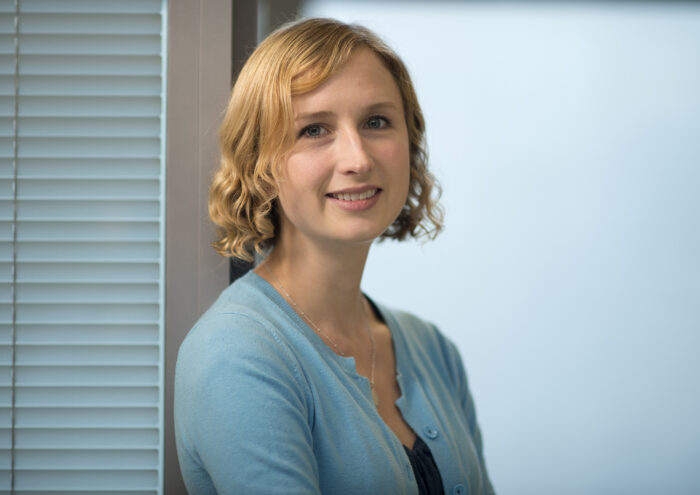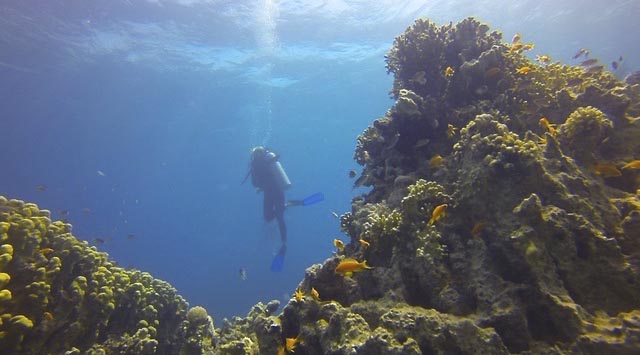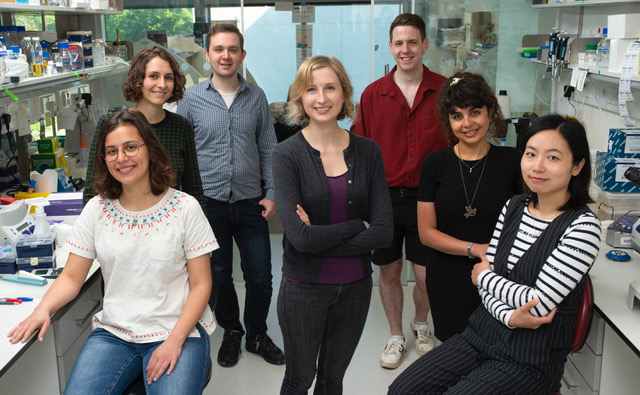The second in our series of group leader profiles written by science writer and LMB Alumna, Kathy Weston, is a profile of Rebecca Taylor, a group leader in the LMB’s Neurobiology Division.

It’s probably safe to say that Rebecca Taylor is the only scientist in the world who has an intimate knowledge of lambing sheep and is also a qualified scuba diving instructor. Her route to a group leader position at the LMB has been pleasingly unconventional, starting in Peebles, a small town in the rural Scottish Borders. The oldest of seven children, Rebecca was the first in her immediate family to go to university, reading Natural Sciences at Cambridge, despite having originally been keen to become a vet (hence the sheep midwifery). “I might possibly have been a bit unusual,” she says, “I was quite an intense and serious child, and as the oldest, there was no path to follow, so I ended up making my own.”
Whilst thinking about what to do after her undergraduate degree, Rebecca saw an advert in the back of Nature for a postdoc job in Dublin, and applied, despite having no experience and no PhD. “In hindsight this strikes me as a bit strange, but I wrote to the guy, and he replied saying he thought it was a bit cheeky I was applying for a postdoc, but maybe he would give it a shot,” she says. “So, I went there as a research assistant, and it was fun, so I stayed on and did a PhD.”
Rebecca’s PhD was a bit of a bumpy road, and not surprisingly, the experience was bruising; it was the first time she realised that her normal habit of working very hard didn’t always guarantee success. However, she battled her way through, got a decent paper and in the process, developed some resilience. On balance, she thinks the episode was positive: “If I’d just coasted through, I’d have ended up a real brat probably, so it was good for me to have had that experience of failure,” she says. “I’ve become much more compassionate towards people who are struggling than I would have been had my PhD gone smoothly.”
After her PhD, Rebecca was pretty burnt out, so decided to take a bit of time to think what to do next. “I took a year out and worked as a scuba diving instructor,” she laughs. “Diving kept me sane during my PhD – there’s something about going out in a boat and leaving the world behind you. And it was a challenging skill and a challenging environment, which is what I like!”
Rebecca headed off to Egypt where she became a qualified dive master with expertise in wreck diving, and then went on to work in Honduras and Mozambique. “It was different and I loved it,” she says, “but in between Egypt and Honduras I interviewed for a postdoc, as I realised I missed the intellectual engagement of doing science.”

Looking for a big problem that would be fun to work on, Rebecca hit on the biology of ageing. She already knew from her PhD work that it would be possible to ask molecular questions about ageing using the nematode worm C. elegans, so in her spare time in the Egyptian resort of Dahab, she did some internet surfing for a good lab in which to postdoc. She came up with two names: Cynthia Kenyon, an LMB alumna who’d founded the worm ageing field, and one of Cynthia’s former trainees, Andy Dillin.
Andy’s lab was at the Salk Institute, which famously is located right next to the Pacific Ocean in San Diego. It seemed like a perfect place to transition back into the rigours of academic life, so Rebecca hung up her fins and moved there in 2007. It was there that she made the discovery from which her lab’s subsequent work has developed.
One of the consequences of ageing in all organisms is that their cells becomes less able to deal with stress, leading to an accumulation of damaged proteins. Left unprocessed, this misfolded garbage can have dangerous consequences for the organism. In humans, impaired cellular stress responses contribute to neurodegenerative diseases such as Parkinson’s and Alzheimer’s, and also metabolic disorders such as diabetes, so it’s an important medical problem.
Damage control responses were thought to be triggered within the cell itself experiencing stress, but what Rebecca found during her postdoc, and latterly in her own lab, was that in C. elegans, a type of stress response could be activated remotely by signals from the worm’s nervous system. In effect, the animals were operating an early warning system alerting cells to incoming danger so they could boost their defences in advance.
By hijacking this stress response pathway by genetic means, Rebecca’s lab has made worms whose cells are being told all the time they are in a stressful environment and need to maintain their resilience. “What’s interesting is that the effect of this constitutive stress signal is to change the way an animal ages,” says Rebecca. “We think that the nervous system in the worm has the ability to make a lifestyle choice. In good conditions, it tells the animal to put all its efforts into reproduction. In worse conditions the choice is to boost somatic maintenance, live longer, and presumably switch back to reproducing when conditions improve.”
The lab has identified which neural circuits are involved in the response, and are busy dissecting the signalling pathways involved. “At the moment we’re sticking to worms, but we’d like to figure out to what extent this is conserved in mammals,” says Rebecca. “There are already some indications that elements of it might be, and clearly, that could be extremely important.”
Rebecca started work at the LMB in late 2014. “I’d had a great time in America, but I didn’t feel it was the place I wanted to be forever,” she says, “and I wanted an environment that was very research focussed, without a lot of teaching. For that, the LMB can’t really be beaten.”

Interestingly, for such an outwardly confident person, Rebecca found the transition from postdoc to group leader quite alarming, in ways she hadn’t anticipated. “I’d never done research in the UK so I didn’t really know anybody, and to suddenly be put in an empty lab space and an empty office, I was like, oh no!” she says. “I knew it was a bit ridiculous to feel so isolated, because everyone went out of their way to be friendly, but it was a shock not to be surrounded by the postdocs I was used to working with. And when it came to interacting with the other group leaders, I suddenly had a really bad case of imposter syndrome — I felt like a work experience student who’d accidentally been shown into one of the offices!”
“I really struggled with it,” Rebecca confesses. “I ended up hiding in my office quite a lot, which of course only made it worse, and unfortunately, I think it impeded my work.”
Ironically, things improved when Rebecca had to deal with a very difficult situation with a competitor, and was forced to ask for some advice, “It was only then I realised that getting help from people was OK,” she says. “I’m not like that temperamentally, and there was that feeling of not wanting to be exposed as not good enough – it was a really powerful force. But I was in desperate measures, so I asked as many people for help as I could think of, and they were all so kind and helpful that it made me think ‘why didn’t I just do this sooner?’ It’s been a big learning experience!”
Rebecca was particularly struck by how much the sympathy and support of other women, both inside and outside the LMB, helped her through. “Liz Miller was one of the people I went to and she was amazing,” Rebecca says. “She gave me specific practical advice on how to write cover letters to editors, that sort of thing, and that was really good.”
Since then, the LMB’s female group leaders have instituted a regular fortnightly meeting, and Rebecca, Liz and Katja Röper attended an EMBO-run self-leadership course for women. “It ended up sparking some conversations that I found really helpful,” Rebecca says. “I discovered that some of the things I thought were unique to me are actually common problems, for example not being listened to and taken seriously in a round table discussion where you’re the only woman. I still see myself as a work in progress there, but once you’re aware things like that are happening, you can start to do something about it.”
Now firmly embedded in LMB lab life, Rebecca has some advice for future new starters: “I would absolutely recommend the LMB as a place to come, but to some extent it is what you make of it,” she says. “Make sure you find people you can ask for help and advice — people you can talk about science with and have coffee with. It’s really worth making an effort to find that community, because you’ll discover that it’s all here waiting for you.”